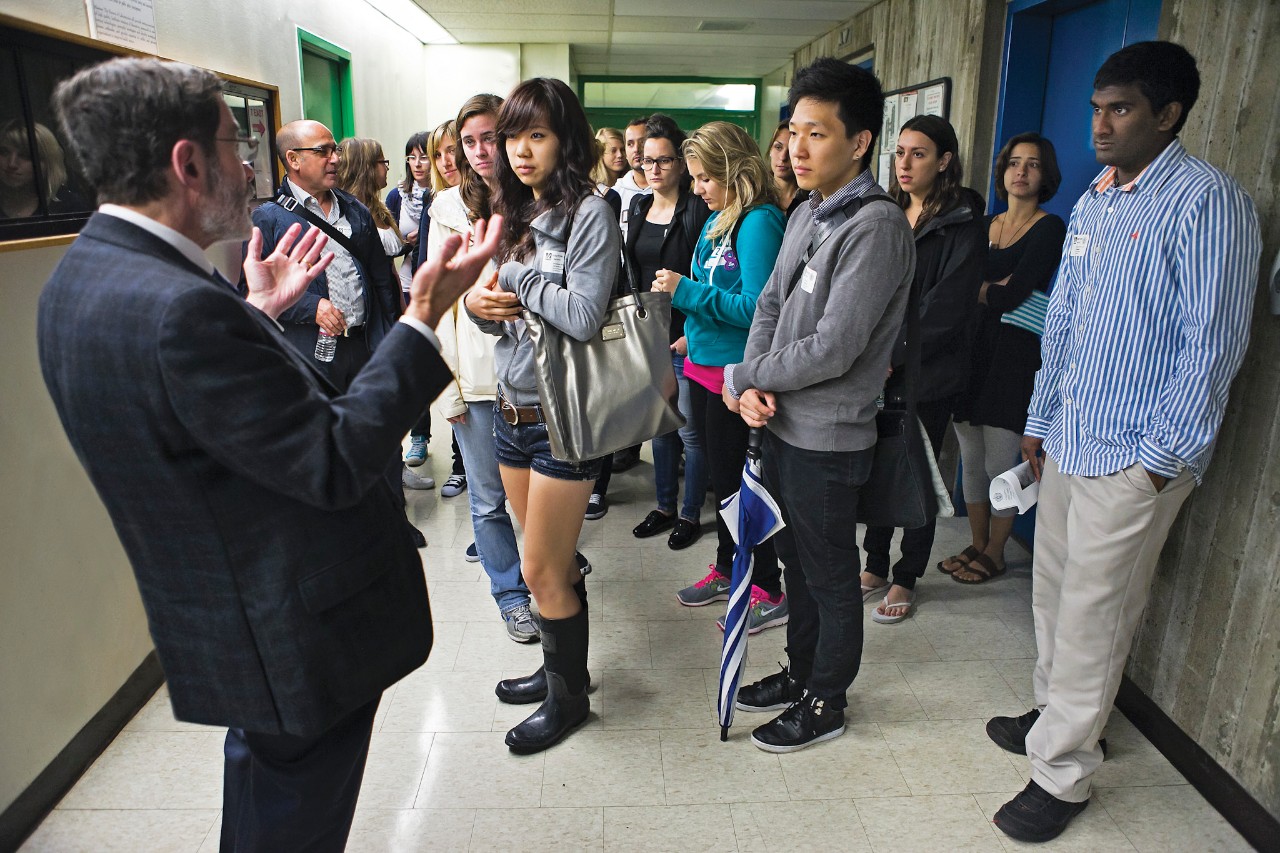
Alfred DeMaria, state epidemiologist and medial director for infectious diseases as the Department of Public Health, leads students through the department's Hinton State Laboratory
Touring the Ether Dome at Massachusetts General Hospital the morning of June 28, a group of nursing and pre-med students were absorbed in a historic moment. But it wasn’t the first public demonstration of ether used as a surgical anesthetic, which took place in the celebrated amphitheater in 1846. It was breaking news headlines crawling across the students’ smartphones, reporting that the United States Supreme Court had upheld the Affordable Care Act. After reading the news that the controversial law to expand health care coverage would stand, several students applauded.
The students visited the hospital landmark on the next-to-last day of Global Healthcare: Meeting Challenges and Making Connections, a four-week course that brought together 26 students and 30 faculty from Boston College and two nursing schools in Lausanne, Switzerland (along with one from the University College Dublin School of Nursing), on the Connell School of Nursing (CSON) campus. English- and French-speaking students and faculty spent most of the month exploring issues at the forefront of global health—quality and safety, ethics, violence, and palliative care—particularly as they affect vulnerable populations.
A three-credit elective supported by the Connell Fund, Global Healthcare is designed to expose students to a range of practices and public health challenges, especially in the United States and Switzerland, and to broaden their perspectives as future health care professionals working in a world with vast social and medical problems. It is a centerpiece of a formal collaboration that the Connell School and the University of Applied Sciences Western Switzerland signed in November 2010, agreeing to exchange teaching and research faculty, jointly develop international academic programs and scientific research projects, and work together on academic publications and research of mutual interest.
“It’s vital for students to understand the world’s problems,” said Colleen Simonelli, the clinical associate professor who developed the curriculum with other Connell School faculty and Swiss colleagues. “Anything we can do to foster critical thinking and enhance students’ powers of observation will make them better health care professionals. I’m grateful to the faculty and other speakers who participated. They recognize the importance of educating our young people to be global thinkers.” She said planning is under way for next summer’s version in Switzerland, which will be open to 16 students and four faculty from Boston College.
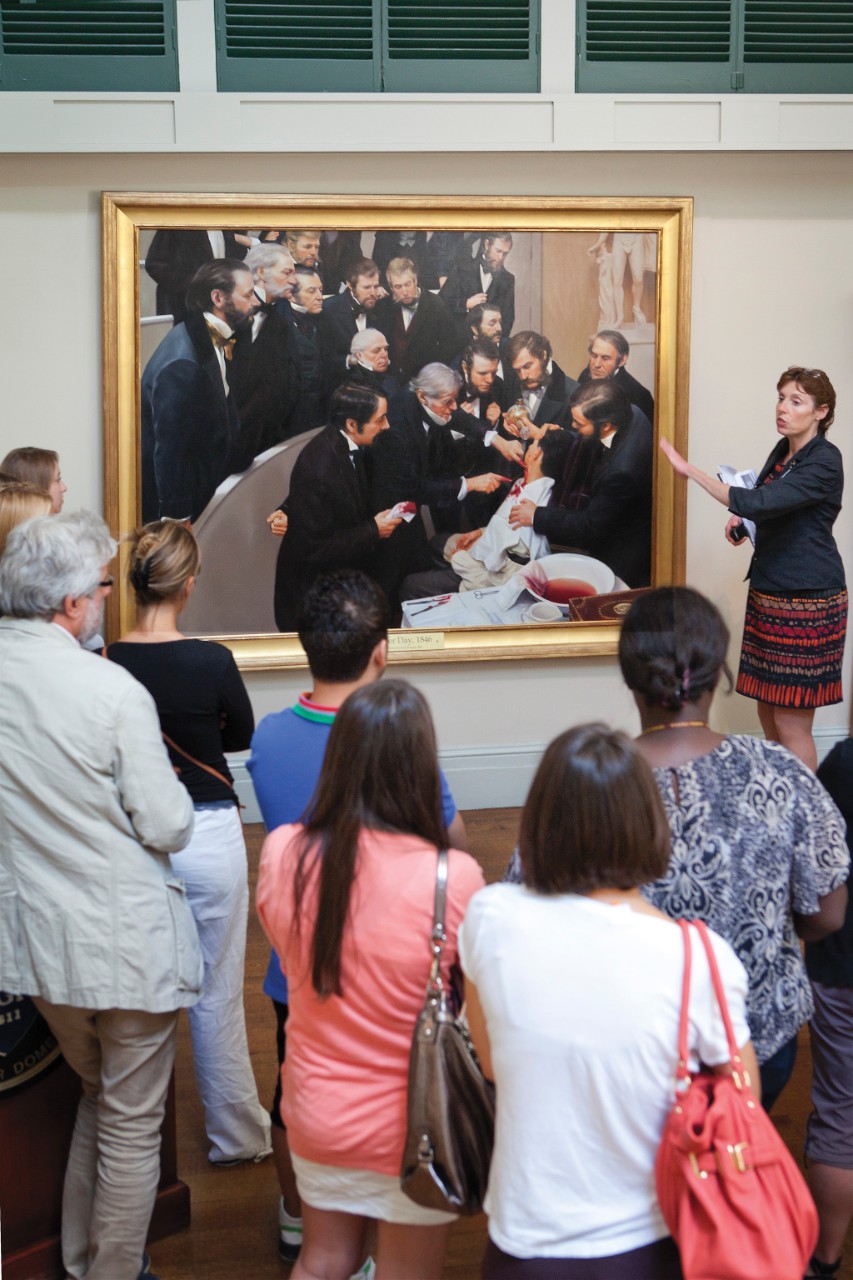
Donna J. Perry (right), global nursing education manager at Massachusetts General Hospital, shows students the Ether Dome painting that depicts the first public surgery using the anesthetic ether.
Jam-packed days
Sixteen Swiss students from Haute Ecole de Santé Vaud (HESAV) and Haute Ecole de la Santé La Source (ELS) and 10 from Boston College —including six nursing students (five of them undergraduates), three from the College of Arts and Sciences, and one from the Woods College of Advancing Studies—took the intensive course, which met from June 4 to 29. Course material was organized around four themes—palliative care, violence, health care, and ethics—that gave faculty and guest speakers opportunities to share insights from their clinical and scholarly work.
CSON Assistant Professor Melissa Sutherland, for example, described the emotional and health consequences of intimate partner violence (aka domestic violence) and an “aha” moment, when she realized it is a risk factor for sexually transmitted infections. She urged students to “ask the right questions of your patients—‘Have you been hit, slapped, kicked, punched, or choked?’” and to look at the patient, not the chart, when posing these questions.
Clinical Instructor Terri LaCoursiere Zucchero recounted some of her work with homeless people in Hawaii, many of whom “suffer from chronic illnesses, substance abuse, mental health disorders, and the consequences of living outside, even though Hawaii is beautiful and considered to be paradise,” she said.
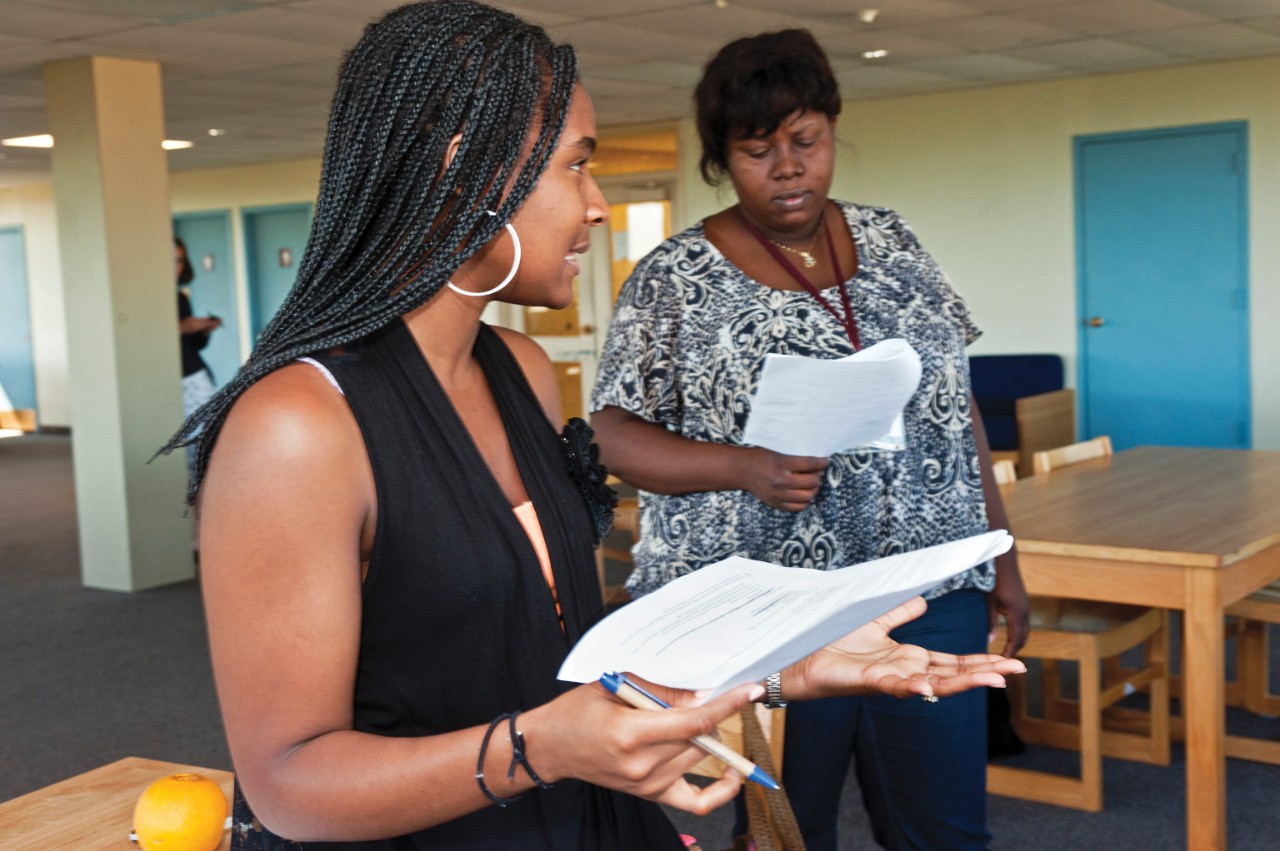
Kim Edouard '14 and Haute Ecole de Santé Vaud student Faty Sarah Diamuini rehearse a classroom presentation.
A typical day involved two or three lectures on campus, often led by one of 24 CSON or five Swiss faculty members, as well as trips to Boston-area teaching hospitals and laboratories, the Massachusetts Department of Public Health, swissnex Boston (a “science consulate” that promotes global intellectual exchange), or the Veterans Affairs (VA) medical center in West Roxbury.
At the VA center, Vanessa Coronel, a patient safety nurse, described the hospital’s efforts to prevent patient falls—and her own nightmare as a new nurse: “I left my patient sitting in the bathroom and didn’t lock the chair when I left. When I came back, the patient was on the floor,” she said. “I want you to learn from my mistakes. Please make sure you lock the wheels.”
Students on the site visit observed tools the government-run system has developed, such as a wireless barcode system to make sure patients get the right medications. They saw other innovations, among them a kit for fending off delirium and several short training videos in a VA series that demonstrates common clinical errors. Judith Vessey, a nurse scientist and Leila Holden Carroll Professor in Nursing, explained how an organization builds a “culture of safety” and stressed the importance of open communication. “Think of patient safety as a team sport, and the patient is part of the team,” she told the group.
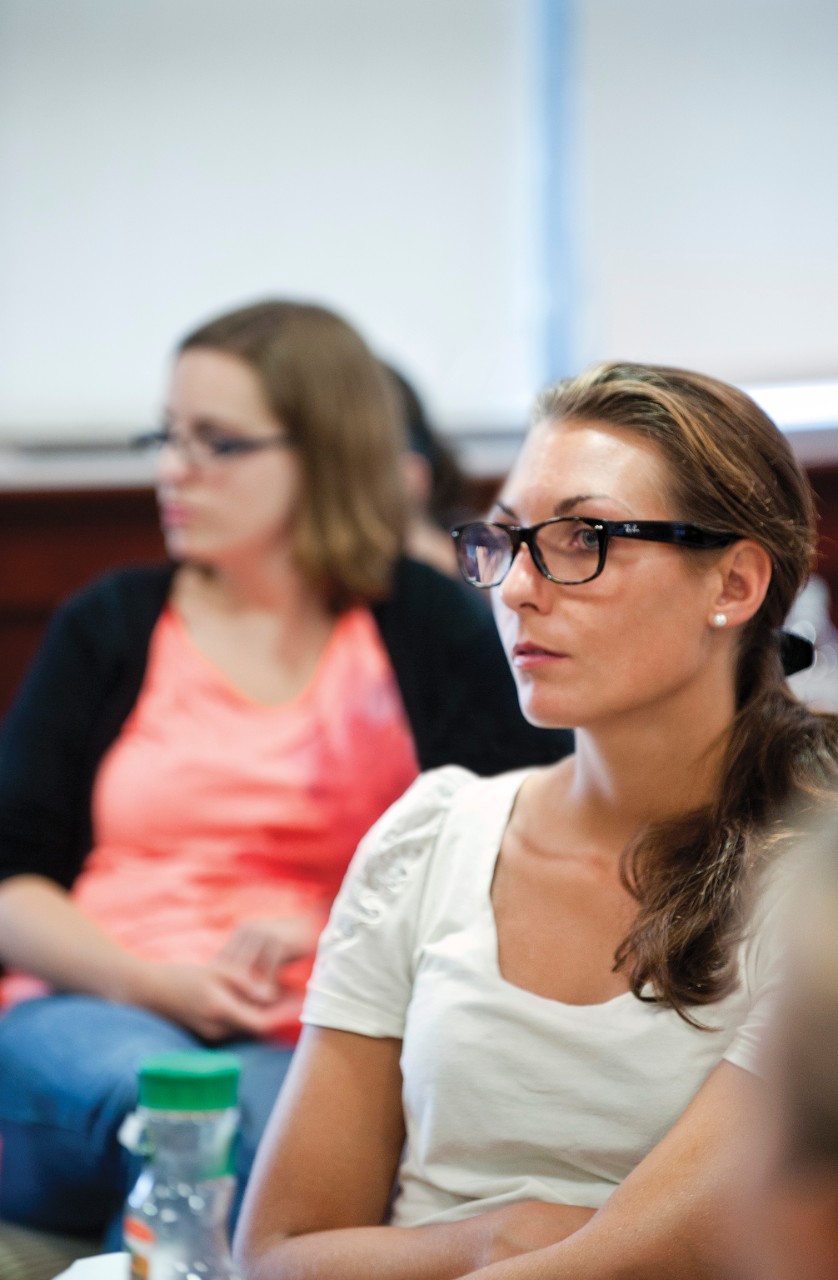
Haute Ecole de Santé Vaud student Alexandra Meylan in class.
“I’ve never learned anything like this,” said Sahaan Sozhamannan ’13, a premed student, as he toured an inpatient floor at the VA. “This course gives a clinical outlook we don’t get in microbiology class. This is closer to what we’ll be doing as doctors.”
Cross-cultural learning
With students and faculty from both sides of the Atlantic in attendance, opportunities to compare and contrast health systems in the United States and Switzerland arose often. Students looked critically at such areas as life expectancy (81 in Switzerland versus 78 here), spending (both systems are among the world’s most expensive), and assisted suicide (generally legal in Switzerland; allowed in only three U.S. states). “The most important difference is that the Swiss health care system is universal; every person who is living in Switzerland more than three months must have health insurance,” observed La Source Professor Blaise Guinchard. “For a nurse, that means that we accept always all persons in a hospital. We don’t ask for the credit card before caring.”
Although the classroom topics were generally heavy— children with cancer, health care disparities, human trafficking, and the like—there was plenty of upbeat chatter in English and French during breaks. Evenings featured social gatherings, optional excursions, and homework assignments such as readings and reflections on the course work. The class culminated with skits the students developed and performed to convey each of the major course themes.
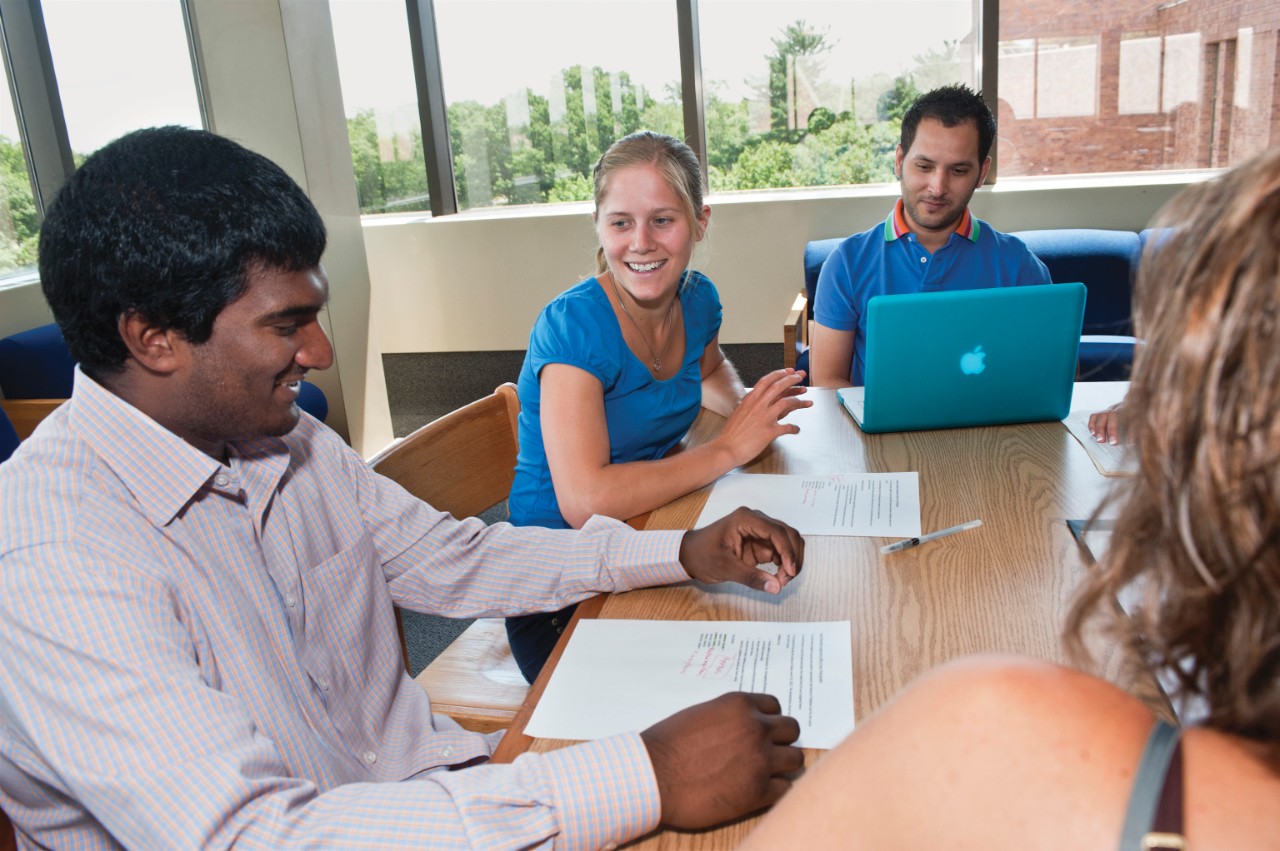
Sahaan Sozhamannan '13 and Anne-Sophie Reymond of Haute Ecole de la Santé La Source evaluate health care providers' role in ethical care issues.
The Swiss students, many of them first-time U.S. visitors, seemed to relish the opportunity to study in Boston and experience Fenway Park, a Duck Tour, and other signature Beantown activities—despite tempestuous weather that went from raw to sweltering, soggy to crystalclear, within days. American students enjoyed being with them, and the group worked around their differences in language and customs.
“My favorite memory was the fire drill during the first week,” recalled Liz Miller ’14 who lived in Walsh Hall with the visitors. “The alarm went off, and the [Swiss] girls were frantic. I tried to explain that we just had to leave the building for a couple of minutes, but they couldn’t grasp the idea. Each girl grabbed her brand-new shoes, cigarette stash, passport, and laptop before finally leaving. We all enjoyed a good laugh afterwards.” By being in the dorm, Miller noted, “I was able to learn about the Swiss and their culture, even though I speak only English. It was easy to connect because we were around the same age and had similar interests.”
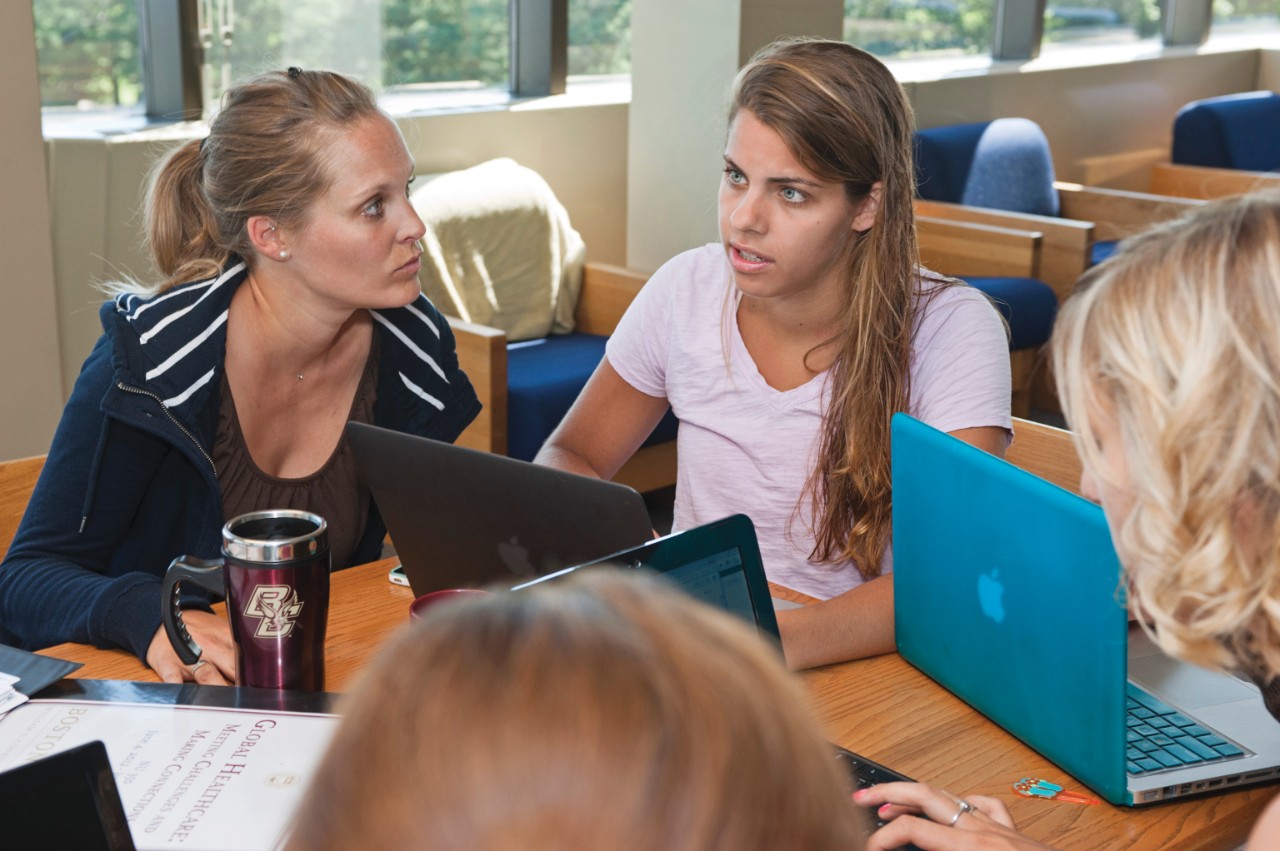
Mélanie Imesch of Haute Ecole de la Santé La Source and Liz Miller '14 consider the role governments play in health care policy, access, quality, and cost.
Student feedback on the course indicates its debut was a success. Sarah Webber ’14 said Global Healthcare illuminated the varied roles that nurses perform around the world, including providing relief to disaster-stricken places like Haiti. “We’ve also learned about the role nurses can play in policy making in the hospital system,” Webber says. “We already know that you’re the patient’s biggest advocate, but you need to be their advocate in the system as well. This course helps you see the big picture.”
Kimberly Edouard ’14 said the classroom experience “went beyond all of my expectations. We got to see how passionate the faculty are about their work.” She also valued the trips to Mass General, Boston Children’s Hospital, Dana-Farber Cancer Institute, and the VA medical center. “Visiting the hospitals in Boston was inspiring,” Edouard reports. “We had an inside look at the different environments where we will be working.”
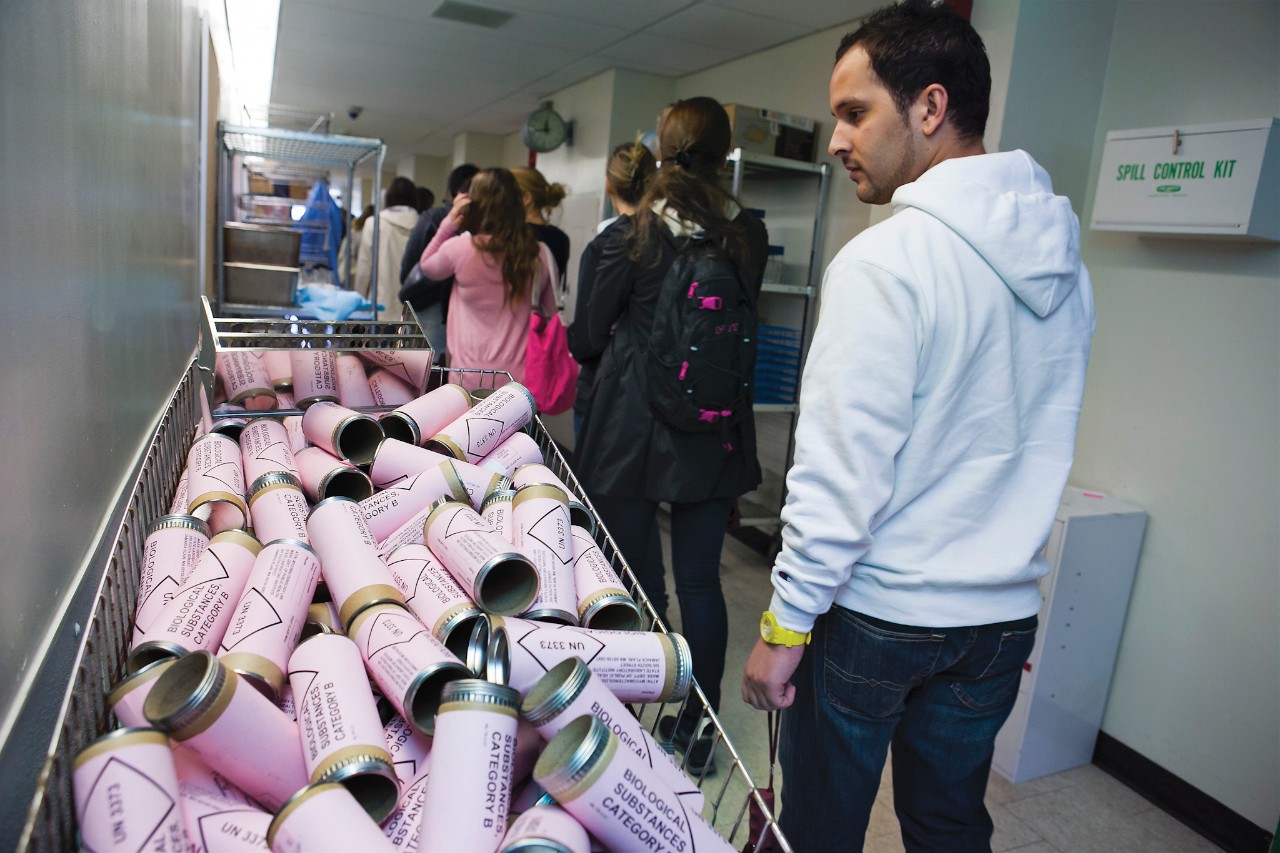
Haute Ecole de Santé Vaud student Nacef Wesselbel tours the Department of Public Health.
Haute Ecole de Santé Vaud student Nacef Wesselbel said the Global Healthcare classes “were really interesting, and the visits and activities helped us to integrate into American life. I’ve appreciated the American mentality because you respect foreigners, even though they do not master English very well.”
Added Gabriela Skalova, another student at the school, the program “allowed me to have a new and broader vision of patient care, and I was able to discover a new city and its wealth. This month, I lived a wonderful, rewarding life experience.”


